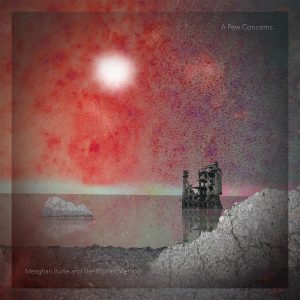By Sam Crawford, special to the Sybaritic Singer
Try Googling “grunge-cabaret songs” (yes, put it in quotes) and you’ll likely retrieve only a handful of results, but they’ll probably all refer to Meaghan Burke. An impressively polystylistic cellist, vocalist, and composer, Burke, and the contemporary, feminist string quartet of which she is a founding member, The Rhythm Method, recently released a new album on the Gold Bolus Recordings label titled A Few Concerns (GBR052). Raw, experimental, and both culturally and politically aware, A Few Concerns unapologetically addresses “a few concerns” that Burke and her string-playing sisters share about human civilization, the current state of the world, and modern American life.
The first lyrics of the opening track, Hysteria, revealingly hint at deeper, historically entrenched subject matter: “Oh wandering womb, where do you go?…” Here, Burke lullingly alludes to man’s primitive idea of the “wandering womb,” the ancient Greeks’ medical answer to a wide range of female ailments and emotions, pathologically attributed to a discontented and displaced uterus. In her 2018 opinion piece for BBC Future, Leah Kaminsky sums up this problematic history:
“…We are all familiar with the term ‘hysteria’ – derived from the Greek word for uterus, ‘hysterika’…The first mental disorder attributed to women, the idea of hysteria can actually be traced all the way back to the ancient Egyptians…But it was the Greeks who argued that the uterus was particularly prone to ‘wandering’…The idea persisted through the centuries: in the 19th Century it became a go-to diagnosis amongst a male-driven medical profession. ‘Hysterical ladies’ began filling doctors’ waiting rooms…But hysteria – which was finally removed from the American Psychiatric Association’s list of modern diseases in 1952 – seems relatively archaic today. Less discussed is how much of the rest of the language of medicine remains draped with patriarchal terms…”
And there it is: the first among Burke’s concerns (in order of track listing, if not necessarily priority), the patriarchy. Lyrical phrases like “…Doctor’s orders…,” “…It’ll go away any day…,” and “Don’t get upset / It’s just a little case of hysteria…,” evoke the image of women being patronized (or worse, gaslighted), and having their concerns minimized. These lines, and others in Hysteria, also remind us of an unjust reality in which women must advocate more frequently and fervently for their own health and for their own rights within a male-dominated society.
Ghostly drones depict aural impressions of misty fields, cloud-strewn skies, and empty front porches
The rest of the album is equally hard-hitting. Little Disaster captures the confusing blend of joy and sorrow within a complicated relationship, raising questions about individual identities and power dynamics. When Burke lovingly sings “…Shacked up in our hiding place / ‘Til I don’t know whose things are yours / And I don’t know whose limbs are yours…,” the scenario she describes feels all too real in the midst of the COVID-19 pandemic. It’s a familiar visual for those of us who are currently quarantined with a partner, and a potentially painful reminder for those of us who aren’t.

Commenting on the futility of war and the illusion of national security, Coda has a certain Southern Gothic sensibility and sounds like a tone poem in miniature, albeit with vocals. Through it all, the sonic imagery is masterful. The song’s longer-than-expected introduction, with ghostly drones and gossamer-thin threads of streaming sound, depicts aural impressions of misty fields, cloud-strewn skies, and empty front porches.
Like Hysteria, certain songs from A Few Concerns magnify more of the age-old challenges particularly faced by women. In “Smile,” the theme is harassment; the quartet personifies the “everycreep” guilty of telling females how to walk, look, and feel, and Burke effectively uses both the lower (deep) and higher (airy) registers of her voice to convey the unsavory “oiliness” of unwanted comments like “…Why don’t you smile, girl?…” In Eggshells, Burke focuses on societal pressures and double standards. The song is a brooding reflection on the exasperating demands and expectations placed on women in terms of emotional behavior, beauty standards, and competition (“…Nobody told you that the decks were stacked against you / Nobody told you that it’s not enough to be just as good”).
Cry is so immediately accessible in its striking simplicity and relatability
Other songs feel more distinctly American. Cry is so immediately accessible in its striking simplicity and relatability, you can easily imagine hearing it in a scene or soundtrack from a television show or an indie film. “Sometimes a girl needs to cry on the subway…,” Burke emphasizes, matter-of-factly. She then comments on the emotional needs and vulnerability of men (“…Sometimes a boy needs to cry in a stairwell…,” “…Sometimes a man needs to cry on the sidewalk…”) before acknowledging that, as R.E.M. once put it, everybody hurts. In the final refrain, the whole quartet plainly echoes its agreement in unison: “Sometimes we all need to cry in the subway.” Superpower speaks to the growing pains of questioning and reevaluating one’s own patriotic allegiance. The song begins a cappella with Burke and The Rhythm Method sweetly and calmly asserting in bluesy, four-part harmony that “There’s no such thing, sir / As a beautiful wall…,” a clear rebuke of Donald Trump and his presidential administration’s efforts to build a “big, beautiful wall” to expand the Mexico–United States barrier. The vocal prowess of the quartet is on full display here, especially the stirringly strong cry and tight-locked harmonies on the lyrics “…This is NOT what I signed up for…” The ensemble’s sense of united “girl power togetherness” is fantastic. The joy and playfulness of music-making is also unmistakable. Delightfully quirky percussive sounds – whizzes, pops, cracks, slides, slaps, grinds, squeaks, shakes, rattles, clacks, quacks, and bird calls – expand and accelerate throughout the song. Politically as well as musically, Superpower comes across as a metaphorical “middle finger,” a kind of celebration in defiance of oppressors, symbolizing triumph in spite of Trump. And it’s perhaps this element of the album that feels most timely, particularly in light of the fact that our newly inaugurated President Joe Biden recently signed a series of Executive Orders to terminate immediately the construction of “the wall” and to start the reversal of similarly damaging actions and polices related to U.S. immigration.
Ultimately, the sonic landscapes and musical storytelling presented on A Few Concerns serve as both an engaging, artistic record of the times and a song-fueled testament to grief and pain. But the album is also a powerful reminder that things can, and often do, get better; like a Google search, the results we ultimately hope to see (in the world, or on the web) will invariably depend on our input, shaped by the questions and concerns we offer and elevate.
 Sam Crawford is a musician (vocalist, composer), information professional, visual artist, and self-proclaimed “nerd” who currently serves as the Performing Arts Librarian at California Institute of the Arts (CalArts). As a composer, he has studied with Julia Wolfe, Morton Subotnick, Justin Dello Joio, and Ezequiel Viñao, and participated in masterclasses with Steve Reich, Louis Andriessen, Meredith Monk, David Lang, Michael Gordon, Nico Muhly, Derek Bermel, Annie Gosfield, and Paul D. Miller (DJ Spooky), among others. He has collaborated with a range of soloists and ensembles, including groups such as the New York-based Cadillac Moon Ensemble, W4 New Music Collective, and The Generous Ensemble, as well as with various individuals associated with Bang on a Can and the Bang on a Can Summer Music Festival at MASS MoCA, where he served as a 2012 Composer Fellow. As a librarian, he has performed a wide array of information work for a variety of federal, public, and private institutions, including the Library of Congress Music Division, the Homeland Defense and Security Information Analysis Center (HDIAC), the University School of Nashville, and the San Francisco Opera. Before joining CalArts, Sam served for nearly 4 years as the Academic Librarian at Northern Marianas College, in Saipan – the largest municipality within the U.S. territory of the Commonwealth of the Northern Mariana Islands (CNMI).
Sam Crawford is a musician (vocalist, composer), information professional, visual artist, and self-proclaimed “nerd” who currently serves as the Performing Arts Librarian at California Institute of the Arts (CalArts). As a composer, he has studied with Julia Wolfe, Morton Subotnick, Justin Dello Joio, and Ezequiel Viñao, and participated in masterclasses with Steve Reich, Louis Andriessen, Meredith Monk, David Lang, Michael Gordon, Nico Muhly, Derek Bermel, Annie Gosfield, and Paul D. Miller (DJ Spooky), among others. He has collaborated with a range of soloists and ensembles, including groups such as the New York-based Cadillac Moon Ensemble, W4 New Music Collective, and The Generous Ensemble, as well as with various individuals associated with Bang on a Can and the Bang on a Can Summer Music Festival at MASS MoCA, where he served as a 2012 Composer Fellow. As a librarian, he has performed a wide array of information work for a variety of federal, public, and private institutions, including the Library of Congress Music Division, the Homeland Defense and Security Information Analysis Center (HDIAC), the University School of Nashville, and the San Francisco Opera. Before joining CalArts, Sam served for nearly 4 years as the Academic Librarian at Northern Marianas College, in Saipan – the largest municipality within the U.S. territory of the Commonwealth of the Northern Mariana Islands (CNMI).
